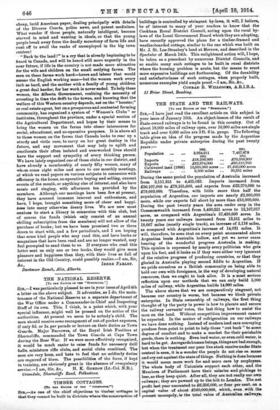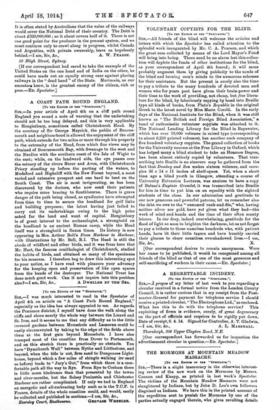THE STATE AND THE RAILWAYS.
[To rag EDITOR. or TIM Britlf,T0,4”1
have just read the excellent article on this subject in your issue of January 10th. An object-lesson of the result of State-owned railways is to be found in this country. Out of about 18,000 miles of railway open, over 16,000 miles are single track and over 8,000 miles are 3 ft. 6 in. gauge. The following table gives an idea of the progress made by the Argentine Republic under private enterprise during the past twenty years
1895. 1911.
Population Imports Exports Cultivated land (1896) Railways ... 3,954,911 .,.
1892.
£18,296,000 ...
£22,674,000 ...
13,925,000 acres ...
6,500 miles ... 7,467,875
1912.
£76,359,900 £95,315,700 57,450,000 acres 20,531 miles During the same period the population of Australia increased from 3,151,355 to 4,425,083. Imports increased from £30,107,000 to £78,165,000, and exports from .233,370,000 to £79,093,000. 'Therefore, with little more than half the population of Argentina, our imports are nearly £2,000,000 more, while our exports fall short by more than £16,000,000. During the past twenty years the area under crop in the Commonwealth increased from 5,430,221 acres to 12,107,017 acres, as compared with Argentina's 57,450,000 acres. In twenty years our railways increased from 13,551 miles to 18,667 miles (mostly single track), an increase of 5,116 miles, as compared with Argentina's inoresee of 14,031 miles. It will, therefore, be seen that on every point enumerated above Argentina beats Australia hollow, and yet we never cease hearing of the wonderful progress Australia is making. This opinion is expressed by nearly every politician who gets upon his feet, and it looks as if they were either very ignorant of the relative progress of producing countries, or that they gloried in Australia playing second fiddle to Argentina. If we pride ourselves as a British community on being able to hold our own with foreigners, in the way of developing natural resources, then we ought to look alive. It is a most aerioua reflection upon our methods that we can only build 5,000 miles of railway, while Argentina builds 14,000 miles.
The above shows that we are comparatively stagnant, not because our country is worse, but because we block private enterprise. In State ownership of railways, the first thing thought of by the party in power is how to placate and secure the railway Servants' votes, the last thing how to assist the man on the land. Without competition improvement cannot be expected. In the matter of refrigeration on our railways we have done nothing. Instead of modern iced cars conveying produce from point to point to help those "out back " to some degree of comfort and to make a market for their perishable goods, there is nothing. Even iced water, or even cold water, is hard to be got. As regards human beings, thingsare bad enough, but when the treatment our poor live stock receive under State control is seen, it is a wonder the people do nob rise en masse and cry out against the state of things. Nothing is done because it would mean more work for and more care by employees. The whole body of Unionists support each other, and the Members of Parliament have their salaries and pickings to lose, so they keep quiet. After all, they are not really our own railways ; they are pawned up to the hilt to London. The net profit last year amounted to £6,356,000, or four per cent. on a capital value of about £160,000,000, which, even with the present monopoly, is the total value of Australian railways,
It is often stated by Australian:1 that the value of the railways would cover the National Debt of their country. The Debt is about 2320,000,000 ; so it about covers half of it. There is not one good point for the producer in the present system, and we must continue only to crawl along in progress, whilst Canada end Argentina, with private ownership, leave us hopelessly [If our correspondent bad oared to take the example of the United States on the one band and of India on the other, he could have made out an equally strong case against placing railways in the " dead hand " of the State. Mortmain, as our ancestors knew, is the greatest enemy of the citizen, rich or poor.—En. Spectator.]











































 Previous page
Previous page